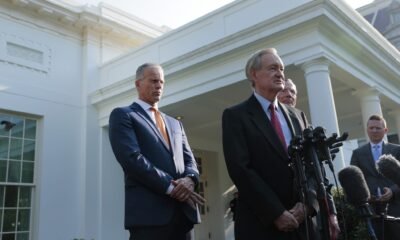arizona
Jones Faces Off: Will Your Vote Champion Secular Democracy or Christian Nationalism?

A deep dive into the complexities of American political discourse reveals unsettling connections to historical events, particularly with Christian Nationalism. This perspective urges readers to examine the historical context underpinning modern political ideologies, notably the Doctrine of Discovery, issued by Pope Alexander VI in 1493. This papal decree declared that any land not claimed by a sovereign Christian nation could be taken by those who ‘discovered’ it, along with their indigenous inhabitants.
Such doctrines paved the way for European explorers and settlers to assert dominance over new lands and peoples, legitimizing slavery as they sought to expand territories. Despite Pope Francis’s recent repudiation of this doctrine in March 2023, the implications persist in U.S. law and policies. Founding figures like Thomas Jefferson asserted that the United States inherited these legal claims following the Revolutionary War, a position upheld by the U.S. Supreme Court in landmark cases.
Proponents of Christian Nationalism often argue that the United States was founded as a Christian nation, a misconception tied to the antiquated Doctrine of Discovery. However, the Constitution, a secular framework, makes no references to Christianity. Many Founding Fathers, including Jefferson and Benjamin Franklin, identified as deists, valuing reason over organized religion. Jefferson even created a version of the New Testament that excluded references to miracles, emphasizing his commitment to Enlightenment principles.
The Virginia Statute for Religious Freedom, crafted by Jefferson and James Madison, established a critical precedent for the separation of church and state, a principle later enshrined in the First Amendment. Thomas Paine, another Founding Father, passionately advocated for this separation, challenging organized religion’s influence over governance.
Contrasting this historical foundation, the Republican Party has seen many of its candidates align with Christian Nationalist ideals. These individuals often resist the established separation of church and state, framing their actions as a form of “spiritual warfare” against perceived threats to democracy.
Christian Nationalism reflects an anti-democratic strain within a broader religious movement. Various organizations, such as the Seven Mountain Mandate and New Apostolic Reform, propagate these ideas. Some prominent political figures have expressed connections to these groups, which openly seek to control numerous societal sectors, including government and education. Extremist factions within these movements are noted for their considerable financial support for like-minded political candidates.
In response, voices within the Christian community, like Rev. Jim Wallis, have condemned the intertwining of faith and authoritarianism, arguing that it undermines fundamental tenets of compassion and love espoused by Christianity. Wallis suggests that democratic processes must serve as the battleground against these ideologies.
In Arizona, political tensions are palpable, with candidates such as Kari Lake, who embraces confrontational rhetoric and questions electoral integrity, aligned with the ideologies of the Seven Mountain Mandate. Additionally, Juan Ciscomani’s affiliations with organizations advocating for extreme interpretations of Christian nationalism raise concerns about the future of church-state separation.
As the election approaches, it is crucial for Arizonans to engage actively in the democratic process. Voting for candidates who uphold the values of separation between church and state is essential to counter threats posed by authoritarian figures. Challenging candidates like Lake and Ciscomani by supporting opponents with a commitment to personal freedoms can help shape the future of Arizona’s political landscape.

















